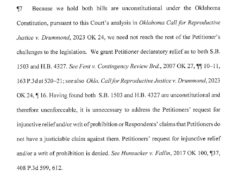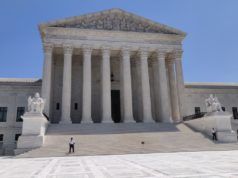
The Fair Labor Standards Act (FLSA) requires that employers pay their employees a minimum wage. If the employee is in a job that “customarily and regularly” receives tips from patrons, the employer is allowed to pay the employee considerably less than the minimum wage if the employer can prove the tips cover the gap (see §203(m)).
Under these wage laws, the employer is allowed to “pool” the tips and redistribute them evenly among employees but only among those employees who customarily and regularly receive tips. In other words, they can’t use a tip share to subsidize the cooks’ wages if they are using the tips to cover the waiters’ minimum-wage requirement.
The tip-sharing rule is technically limited to covering the minimum wage. The statute doesn’t address tip sharing if tips are not used to meet the minimum wage for tipped employees.
An example of the act in action
In 2010, a waitress sued her employer because the employer had a tip-share system that included the cooks and dishwashers. However, the employer didn’t rely on tips to cover the minimum wage; they paid everybody, including the waitress, at least the minimum hourly wage and then threw the tip share on top. The 9th Circuit, in a decision authored by the conservative Judge Diarmuid O’Scannlain, held that the rule saying tips may only be shared among employees that customarily receive tips did not apply to the waitress’ employer because the employer was not using tips to meet the servers’ minimum-wage requirement.
Department of Labor steps in
The Department of Labor (DOL) decided the 9th Circuit’s decision was bad policy. They determined a tip share that included the cooks (and other un-tipped employees) constituted an unfair use of tips to inflate the cooks’ compensation. In most labor markets, experienced cooks can demand quite a bit more than the minimum wage. If the cooks get a tip share, the employer doesn’t have to pay as much to retain them, a benefit that comes at the expense of the servers. So in 2011, the DOL made a new rule on tip sharing that mirrors the minimum-wage tip-share rule but applies to all employers, even those that don’t rely on tips to meet the minimum wage for their servers.
It seems like a good idea. The problem is that the congressional acts, including the FLSA, that give power to the DOL do not expressly give the agency authority to do this. Several employers who pay all their employees at least the minimum wage and use tip shares among all employees sued the DOL, claiming the rule exceeded its statutory mandate.
By now, you might be thinking that this is all pretty mundane. Tip shares aren’t really that big a deal, right? Is this topic even worth a commentary?
Yes, because, as often happens in the law, the legal reasoning behind the judicial decision in this case is much more important than the apparent factual dispute.
Supreme Court may weigh in
In February, a three-judge panel from the 9th Circuit ruled 2-1 that DOL’s tip-share rule was permissible because Congress has not said the department may not regulate tip shares:
The panel held that FLSA section 203(m)’s clear silence as to employers who do not take a tip credit left room for the Department of Labor to promulgate the 2011 rule.
Upon that ruling, there was an immediate call for a more thorough review of the case by a larger number of circuit judges, known as an en banc review.
Earlier this week, the 9th Circuit denied en banc review of the decision, meaning the February ruling is now the Circuit’s official position on the matter. The Supreme Court may weigh in on this soon, and that’s a big deal. The implications stretch much further than tips or the Department of Labor.
Judge O’Scannlain wrote a blistering dissent to the decision to deny en banc review, which included the wonderful footnote:
‘Circuit split’ perhaps does not fully describe the resulting state of affairs. It is more like we have spun out of the known legal universe and are now orbiting alone in some cold, dark corner of a far-off galaxy, where no one can hear the scream ‘separation of powers.’
O’Scannlain’s point is that the panel’s “clear silence” from Congress’ standard for the decision is a vast and dangerous departure from basic principles of administrative law.
Separation of powers at stake
There is a long-running legal battle about separation of powers and the interaction between Congress and executive departments like the Department of Labor: What may the departments do? What must they do? What must they not do?
In general, it goes like this: The departments may do whatever Congress has said they may do, so long as Congress has the power to say so under the Constitution and the department’s individual actions are also constitutional. If Congress speaks ambiguously about what a department is supposed to do, the department can make its own specific rules regarding the issue as long as the rules are reasonable interpretations of its empowering statutes.
The 9th Circuit decision over this tip-share issue would change protocol to be this: The departments may do whatever Congress has not expressly said they may not do, so long as their actions are Constitutional and at least vaguely related to their Congressional mandate.
Tip of the iceberg?
Every good student of the law will occasionally come upon a case that makes him utter the dreaded words “Scalia is right.” This is one that makes me say the only slightly less distasteful “O’Scannlain is right.”
Giving flexibility to executive departments to handle the details and quirks of real life makes sense. Congress can’t possibly come up with laws specific and detailed enough to handle every situation that may arise, so it delegates a lot of its rule-making authority to the departments — but it still must affirmatively delegate that power. To say the power is de-facto delegated unless Congress takes it away, as the 9th Circuit decision essentially does, is a frightening step toward a potentially more authoritarian administrative state.
This tipping business may be a dangerous tipping point if the Supreme Court doesn’t squash it.





















